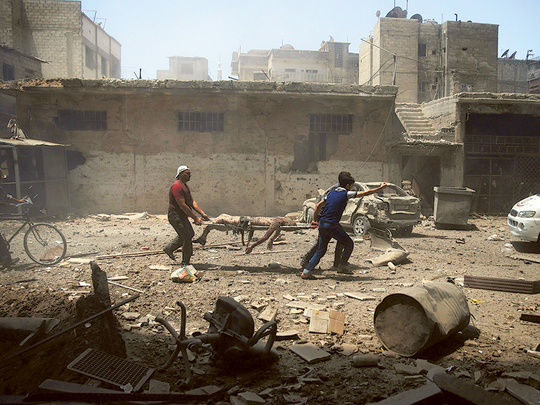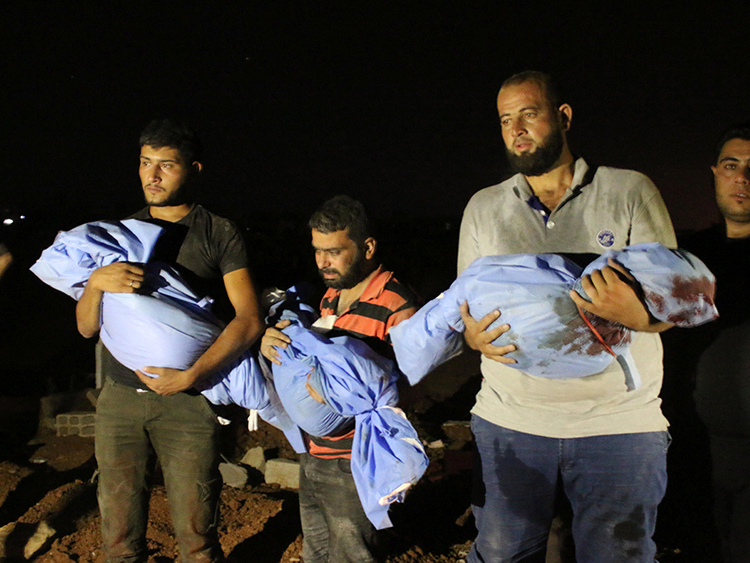
Beirut: Syrian politicians may return to the negotiating table in Geneva next August, ending four months of gridlock in the UN-mandated peace process. The decision was enforced on both camps by their American and Russian backers, who are meeting with the UN in a tripartite conference, also in Switzerland, to set the tone of the Syrian talks.
The Syrian opposition has remained silent and very unforthcoming about the new round of talks, whereas the Syrian regime welcomed them via state-run Syrian TV on Sunday.
When the talks collapsed last April, two top negotiators on the opposition team stepped down, citing lack of progress. Their departure was seen as a veiled concession by their backers to President Vladimir Putin, who has constantly demanded their exclusion from the talks, claiming that both men represent radical groups in the Syrian battlefield.
Before the opposition returns to Switzerland it would have to find replacements to Mohammad Alloush, the top negotiator representing Jaysh Al Islam, and Asad Al Zoubi, a defected officer who now serves on the Free Syrian Army (FSA). Another sticking point at earlier talks was the representation of Syrian Kurds. Turkey had refused their participation, accusing them of having ties to the outlawed PKK, while Moscow wanted them on-board. The unspoken agreement was for Moscow to abandon its Kurdish proxies in exchange for the sacking of Alloush and Zoubi.
More fundamentally, the two sides disagreed on the fate of Syrian President Bashar Al Assad. The Riyadh-backed Syrian group insisted on his departure before any progress could be made, calling for the creation of a Transitional Government Body (TGB) as mandated by the Geneva I talks in the summer of 2012. They were willing to give 50 per cent of seats in the TGB to regime figures if Al Assad agreed to step down. The government delegation, headed by Bashar Al Jaffari, insisted that a TGB was “illegal” and refused to even discuss it at any of the sessions held in Geneva since January 2016. The most Syrian officialdom would accept, he added, was to share power in a “cabinet of national unity” with the Syrian opposition. What the two sides might discuss in the near future is a new proposal making the rounds in Switzerland, which calls on Damascus to appoint three or five members of the opposition in the post of vice-president. One would be for political affairs, one for military, and one for culture. The idea, believed to be the brainchild of Russian Foreign Minister Sergei Lavrov, was originally turned down by both the government and the opposition. It had called for the three or five VPs to create a “Presidential Council” that would run the transition period with Al Assad at its helm, insisting however that the Syrian President would get to run in any upcoming elections. This remains the position of Damascus, Tehran, and Moscow.
According to United Nations Security Council Resolution 2254, the transitional period in Syria ought to start next August. Previously, the Russians had proposed starting off with a new constitution for Syria, one that dilutes presidential powers and decentralises authority from Damascus. It was flatly rejected by Damascus. Al Assad said that his understanding of the transition was from one constitution to the next, but not from the regime to the opposition. With the constitution on hold, the Geneva talks tried to delve into parliamentary and early presidential elections. They were cut short by Damascus unilaterally holding parliamentary elections last April, and government negotiators have strictly refused early presidential elections, asking that they happen on time in the summer of 2021. The Russians however have shown flexibility on early elections, possibly in 2018-2019. They still insist that Assad gets to run in any election.
The Syrian opposition is not too optimistic about the next round of talks, given several major setbacks. Since the Russian army entered the Syrian battlefield last September, the armed opposition have lost almost all villages surrounding the port cities of Latakia and Tartous, and the Syrian army has recaptured stretches of land around Aleppo, in addition to the ancient city of Palmyra in the Syrian Desert.
Turkish President Recep Tayyip Erdogan, a long-time supporter of the anti-regime camp, has little time or appetite for Syria after the recent coup attempt and back-to-back bombings in Ankara and Istanbul. He is fighting on two fronts against Kurdish militias and Daesh, and recently patched up his icy relationship with President Putin, much to the horror of the anti-Al Assad camp. The timing could not have been worse for the Syrian opposition, which has heavily relied on Ankara for arms, money, and aide. The Turkish-backed Ahrar Al Sham, which reigns in the Syrian north, was recently blacklisted by John Kerry as being a “subgroup” for Al Qaida.
The Syrian talks were supposed to take place last June but were interrupted by Ramadan. UN special envoy Steffan De Mistura pushed hard for them to resume, saying that “if the Syrians could fight during Ramadan, then they could certainly negotiate during Ramadan as well”. Neither the Americans nor the Russians were interested in the resumption, however, waiting for the military balance to shift in favour of any of the warring parties.
Since late May, government troops have been advancing in the Syrian north, completing a blockade of the strategic city of Aleppo, half of which is under the control of Islamist rebels since 2012. Some believe that the Turks gave a go-ahead for this advance, refraining from standing in its way, in exchange for Russian guarantees that a Kurdish state will not emerge on their border with Syria.
The siege of Aleppo is expected to force the city’s rebels to choose between surrender and starvation. If they accept the former they will be allowed to leave the city with their light arms and head either to Idlib, which is in the hands of Al Qaida-linked Al Nusra Front, or to Deir Al Zor, which is controlled by the Daesh. It would deprive the rebels of their most strategic city, given that other major cities not held by the government are in the hands either of Al Nusra or of Daesh. If this happens while the Geneva talks are underway, it would severely damage the negotiating leverage of the Syrian opposition and serve the interests of Damascus and Moscow.













